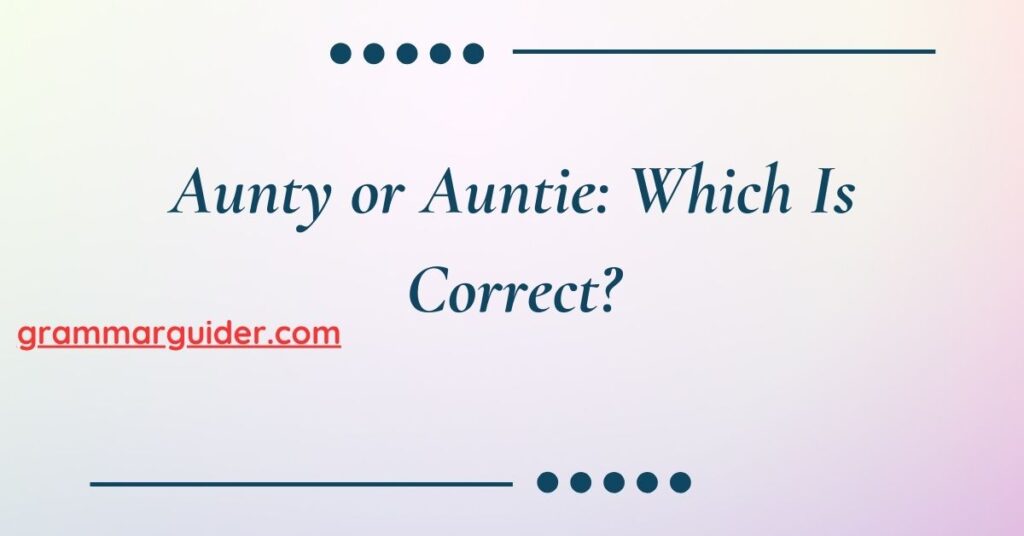The terms “aunty” and “auntie” often spark confusion, with people wondering which spelling is correct or preferred. While both terms refer to a woman’s sibling or the sister of one’s parent, subtle differences exist depending on where you are in the world. For example, you may hear “aunty” more often in certain countries like Australia, while “auntie” might be the go-to term elsewhere. This article explores the origins, usage, and subtle nuances of these terms, diving deep into whether “aunty” or “auntie” is the more accurate choice, especially in countries like Australia.
Aunty or Auntie: The Basics
At the most fundamental level, “aunty” and “auntie” both refer to the same thing. They are informal ways to address or refer to your aunt the sister of your mother or father. While they mean the same, the spelling varies regionally, and it can feel a bit like a local dialect difference.
For example, you might notice that some regions or families prefer “aunty” while others use “auntie.”
Auntie (with an “ie”) is often seen as the more affectionate or child-friendly version of the word. It’s softer and perhaps more playful, which makes it the preferred choice when children address an adult.
On the other hand, aunty (with a “y”) is more commonly used in places like Australia and India, where it carries a somewhat more formal tone but still conveys the same familial closeness.
Is It Aunty or Auntie in Australia?
If you find yourself in Australia, you’ll likely hear the term “aunty” far more often than “auntie”. Australians tend to prefer “aunty”, both in spoken language and in writing, especially within families or in casual settings.
The Oxford Dictionary recognizes both spellings as correct, but “aunty” is more widely used in Australian English.
Here’s an example of how “aunty” might be used in an email:
Example Email (Australian Context):
Subject: Catching Up Soon!
Dear Aunty Emma,
I hope you’ve been well! I’ve been thinking about our weekend getaway plans, and I wanted to check in with you about the dates. It would be great to spend time together at the beach!
Let me know what works best for you.
Take care,
Sarah
As seen in this example, “aunty” is used as a warm, informal address for a relative in Australia, helping to create a personal and relaxed tone in communication.
Aunty or Auntie in Other Regions
While Australia tends to favor “aunty”, the choice between “aunty” or “auntie” can vary across other parts of the world. For example, in places like the United States and United Kingdom, “auntie” is generally more common.
Let’s consider the United States, where “auntie” is often used in the same affectionate and informal way, but it carries more of a childlike tone. People might say “Auntie Susan” rather than just “Aunt Susan” to show closeness.
Example Email (U.S. Context):
Subject: Birthday Surprise!
Hi Auntie Sarah,
I wanted to share a fun idea for your birthday surprise! I was thinking of organizing a picnic in the park. What do you think?
Looking forward to hearing from you!
Love,
Anna
Notice how “auntie” here sounds familiar and endearing, even in a simple email context.
Aunty or Auntie: Which Is Correct?

So, which one is correct? The answer depends on your location, cultural influences, and personal preference. Both “aunty” and “auntie” are grammatically correct, but their usage can vary.
Oxford Dictionary lists both versions, acknowledging that regional spelling and pronunciation differences contribute to this variation.
However, it’s essential to note that “auntie” is typically considered the more affectionate, playful form, while “aunty” is slightly more formal but still casual.
If you want to sound warm and friendly, “auntie” is a good choice, especially when addressing children or close friends.
Aunty or Auntie: The Meaning in Hindi
In languages like Hindi, the terms for aunt or aunty are used interchangeably with the English versions. However, they have their own regional distinctions. The Hindi translation for aunty is often “मौसी (mausi)” or “फूफी (phuphi),” depending on whether the aunt is the maternal or paternal side.
Yet, many English speakers in India will commonly use “aunty” or “auntie” in casual speech to refer to their mother’s sister or father’s sister.
Here’s how “aunty” is typically used in Hindi contexts:
Example:
Aunty meaning in Hindi:
“Aunty” in Hindi generally refers to any older woman, especially those you are familiar with, such as a friend’s or neighbor’s mother. It’s a polite and respectful term used for addressing an older woman, even outside familial relations.
How to Spell Aunty?
Now, for the practical question of how to spell aunty, it’s essential to recognize that there’s no universally right or wrong answer. The spellings aunty and auntie are both accepted in English dictionaries. However, regional preferences play a significant role.
- Aunty: Preferred in Australia, parts of India, and other regions.
- Auntie: More commonly used in the United States and the United Kingdom.
How to Pronounce Auntie
Pronouncing “auntie” is straightforward. It sounds just like it’s spelled: “ahn-tee”. The first syllable is a soft “a,” and the “ie” is pronounced like “ee.”
For example:
- “Auntie Sarah is coming over tomorrow.”
- “Aunty” is pronounced the same way: “ahn-tee”, but the spelling changes.
Plural of Aunty
The plural form of aunty or auntie is simply aunties. Here’s how it looks in a sentence:
- “I have two aunties who live in Melbourne.”
- “We’re planning a family gathering with all the aunties and uncles.”
Uncle and Aunty Meaning
In many cultures, “uncle” and “aunty” are used as terms of respect and affection for older men and women, even beyond family. They can refer to family friends or close acquaintances, much like calling someone “uncle” or “aunt” in the Western world.
- Uncle Aunty Meaning: Uncle refers to the brother of one’s parent, while aunty refers to the sister of one’s parent. However, both terms can also be used to describe non-relatives in certain cultures.
Final Thoughts: Aunty or Auntie – What Should You Use?
The choice between “aunty” and “auntie” often boils down to where you are and who you’re talking to. While both spellings are correct in their respective contexts, understanding the regional preferences and the tone you wish to convey can help you make the right choice.
“Aunty” tends to be more formal in places like Australia, while “auntie” carries a more affectionate vibe, especially in the United States.
In the end, the meaning remains the same: aunty or auntie is a term of endearment used for your mother’s or father’s sister, or even close friends in your extended family.
So, whether you use “aunty” or “auntie”, remember that it’s all about the love and respect you’re expressing for a special person in your life.
Summary Table
| Term | Usage | Region |
|---|---|---|
| Aunty | Used in Australia, India, and other parts of Asia. Slightly more formal. | Australia, India, parts of Asia |
| Auntie | More affectionate, often used in the U.S. and UK. | United States, United Kingdom, and elsewhere |
| Auntie Meaning | Informal term for one’s aunt, affectionate and child-friendly. | Global use, context-specific |
| Aunty Meaning | A respectful term for one’s aunt, more neutral in tone. | India, Australia, parts of the world |

Harley Rose is a seasoned expert in English grammar and writing tips, blending years of knowledge and a love for language into her work. With a sharp eye for detail and a talent for making grammar accessible, Harley shares practical insights that help readers write with precision and flair. Her content is ideal for anyone looking to strengthen their writing skills and express themselves with confidence.

